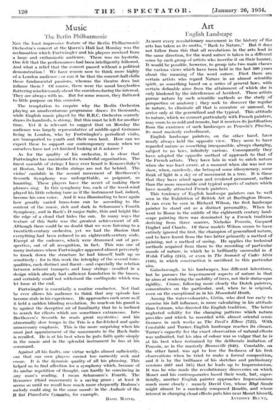Music
The Berlin Philharmonic
NOT the least impressive feature of the- Berlin Philharmonic Orchestra's concert at the Queen's Hall last Monday was the acclamation which Furtwiingler and his players received from a large and enthusiastic audience: There was no hysteria: One felt that the performances had been intelligently followed. And what a relief that the concert passed without a political demonstration ! We have reason now to think more highly of a London audience ; or can it be that the concert-hall chills these fundamental passions, whereas the theatre does but inflame them ? Of course, there were the usual busybodies fluttering mischievously about the corridors during the interval. They arc always with us. But for some reason, they fluttered to little purpose on this occasion.
The temptation to enquire why the Berlin Orchestra playing an unadventurous programme draws its thousands, while English music played by the B.B.C. Orchestra scarcely draws its hundreds, is strong. But this must be left for another time. Yet it is relevant to suggest that on Monday the audience was largely representative of middle-aged Germans living in London, who by Furtwangler's periodical visits, are transported to youth and their own land. How can we expect these to support our contemporary music when we ourselves have not yet finished looking at it askance As for the quality of his orchestra, it is clear that Furtwfingler has maintained its wonderful organization. The finest ensemble of strings I have ever heard is hous.sevitzky's at Boston, but the Berlin strings are not far behind. The violas' cantabile in the second movement of Beethoven's Seventh Symphony was unforgettable, so poignant, so haunting. These players have the secret of making their phrases sing. In this symphony too, each of the wood-wind played his little echoing tune as if the instrument had, indeed, become his own voice. And it was illuminating to hear again how greatly varied brass-tone can be according to the content of the music, rich and dark in Schumann's Fourth Symphony, and in Bach's D major Suite, thin and bright like the edge of a cloud that hides the sun. In many ways the texture of this Suite was the greatest achievement of all. Although there could be no doubt that we were listening to a. twentieth-century orchestra, yet we had the illusion that everything had been reduced to an eighteenth-century scale. Except at the cadences, which were drummed out of per- spective, out of all recognition, in fact. This was one of many instances where Furtwiingler appeared almost perversely to knock down the structure he had hintselfl built up so sensitively ; for in this work the interplay of the several tone- qualities, each distinct and fluent—and especially the relation between reticent trumpets and busy strings—resulted in a design which already had sufficient foundation in the basses, and certainly could not withstand the earthquake which was let loose at the end.
Furtwangler is essentially a routine conductor. Not that lie ever allows his audience to think that any episode has become stale in his experience. Ile approaches each score as if it held a sudden blinding revelation. So much on his guard is he against the deceptive air of familiarity that he is inclined. to search for effects which are sometimes extraneous. Into Beethoven's Seventh he reads great mysteries ; and his abnormally slow tempo in the Trio is a far-fetched and quite unnecessary emphasis. This is the more surprising when his most just appraisement of the movements in the Bach Suite is recalled. He is at his best when he puts faith quite simply in the music and in the splendid instrument he has at his conunand.
Against all his faults, one virtue weighs almost sufficiently,'
one that our own players cannot too earnestly seek and ensue. It is the dynamic quality of all his phrasing. This helped us to find affection for a symphony which, because of its undue repetition of thought, can hardly be convincing in any man's reading. I mean Schumann's Fourth. The Romance (third movement) is a saving grace ; at least it seems so until we recall how much more eloquently Brahms's melody could sing in the same mood : in the Andante of the B flat Pianoforte Concerto, for example. •
BASIL MAINE.










































 Previous page
Previous page